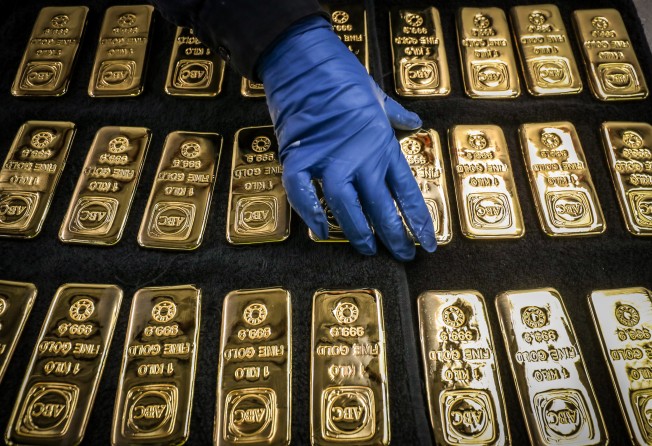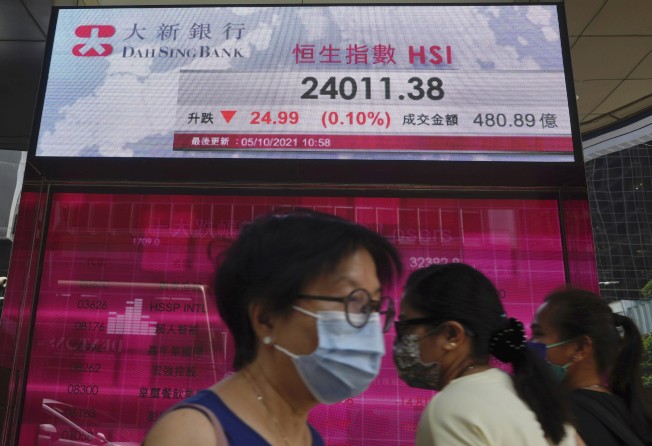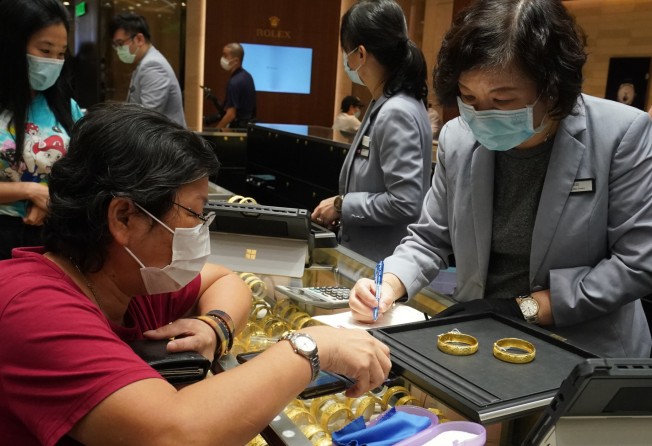
Prepare for a stock market crash and take stock of a golden opportunity
- Stock markets are going to crash, it’s just a matter of when. So there is some housekeeping to be done now
- With gold surprisingly in a downtrend, perhaps it is time to have a look before everyone else notices

Among traders, there have through the decades been two bits of perennial advice, “sell in May and go away” after the bulk of the year’s returns have been made by smart investors who then scarper to the beach. Then, once their golden tans start to fade, “evil October” arrives.
Although stock-market statistics show that performance in October averages out to just about any other month, the month sparks fear in traders’ hearts. It is, after all, the month in which some notable bad things have happened: the Panic of 1907 (a little-mentioned banking crisis, frighteningly similar to 2007), the infamous Black Tuesday, Black Thursday and Black Monday of 1929, and Black Monday of 1987.
Personally, I don’t like Mondays. But October is almost over and there has been no real downturn of any magnitude to worry about (touch wood). Aside from the odd ballistic missile being fired to show who has the biggest rocket and a cold snap this weekend that Hong Kong experts say won’t warrant winter coats, nothing locally has really upset markets yet, although in Europe and the US people are starting to worry about what this winter has in store in economic terms.
There is still time for equity markets to catch the first sniffles of autumn, like I have, before the month is out. As the temperatures drop heading into winter and next year, inflation will spike, driven by rapidly rising fuel prices – now a concern raised by the Bank of England.

The cost of borrowing follows upwards to temper inflation, which will be snapping at our heels by January. And with “greenflation” about to hit us after COP26 in Glasgow, everything may go to hell in a handbasket even before the puffy jackets come out in force. I promise this is all going to happen, and equity markets will crash, I just can’t say when. I think it’s likely to be soon.
Here is a short list of things to do now. The usual housekeeping stuff:
1. Raise some cash. You will be sitting pretty when the markets tumble. But if we are seeing a significant upturn in inflation, which I think we are, cash erodes pretty quickly, especially in a place like Hong Kong where living doesn’t come cheap. Paying off some of the mortgage before rates rise might be a good use of the surplus stuff under your mattress.
2. Don’t buy bonds, they go down as well. Instead, shift to stocks that pay well and regularly, like bonds used to. Sell some of the favourite outperformers in your portfolio and buy some underperformers.
3. Think about geography and relative performance with respect to where the crash will take place first, and consider switching on that basis. The top pick to sell first must be US markets. Hong Kong may be right at the bottom of the list given the very poor performance this year.
4. Given the tightness in supply chains now, especially in the electronics sector, it may be worth holding some commodities which are gobbled up by chip makers. The most accessible is of course gold. If you already like gold, then perhaps a sprinkling of silver and platinum might be in order too.
5. All that done, grab your survival kit and dive into the bunker.

Chicken run
What bothers me most at the moment, however, isn’t a stock-market shakeout – those always happen after a run like we have seen. Rather, it is more the unpredictability of life overall.
For the first time in my career, I’m not sure where the next few years will take us all, or how we can plan for it. Thankfully, my kids are grown up and stand on their own feet with decent jobs, so I am very mobile. And for the moment I plan to stay that way because:
• I can’t get in and out of Hong Kong easily – and I had expected I would be able to by now. So, do I start to think of a short- or longer-term alternative overseas? Nearby in Japan, or Singapore? Then, what can I do to be particularly mobile? I wouldn’t want to be tied down, and need liquid assets quickly accessible. I’ve also got to make sure my mobile office is up to scratch and ready to travel: computer, smartphone, tablet. Maybe I’ll upgrade.
• Covid-19 infection rates appear to be breaking away from vaccination rates – and that wasn’t the plan and now the booster jab is being pushed on us. So no longer can we be convinced that the bug will be squished this year or next. In fact, I believe we are going to have to live with it for years. Anywhere I go could suddenly be a hotbed of infection and subsequent lockdowns, again.
• Hong Kong’s stock-market performance is awful, and the IPO business has all but died despite my original expectations that as Chinese firms head “home” from the US, it would be a boon for the Hong Kong stock exchange. Maybe it will stay this way for now. If a market crash is followed by yet another prolonged recovery, it could take some time to come back.
• Interest rates were supposed to stay low for the rest of my days, right? Now there is a real risk that rates will rise, and if they do, theory dictates that it makes stocks go down further. And bonds will go down too as there is little yield to cushion the fall, unless you have a portfolio of Chinese debt which still pays measurable coupons.
• Levels of debt in all the major economies, even after the 2020-2021 Covid-19 spend, is a fraction of the levels seen after a war and should not be ringing alarm bells yet. Typically, after a war, when debt stocks can be multiples of GDP, governments can cut back spending on armaments and as armies come home, debt can be paid back. However, the war on Covid-19 is far from over and governments’ spending could go on for years, ballooning debt.

Somewhere over the rainbow
So why, then, amid all this uncertainty about life and careers, and the very real threat of equity and bond markets collapsing, is gold still in a downtrend? It doesn’t make any sense and maybe we should think about getting a small pot of it together.
There is never an oversupply, or undersupply, of gold, given that we dig it up in remote areas and bury it again in safe storage underground. There is plenty of gold lying around to satisfy demand, only the price changes depending on what governments, investors and manufacturing are doing with it at any one point.
If you exclude bullion, in 2019 about 50 per cent of gold “used” in the US went into jewellery, 37 per cent to electronics, including computers, smartphones and other devices, 8 per cent for minting official coins, and the remaining 5 per cent went into aerospace, dentistry, glassmaking and decoration.
Since the 1960s, gold has also found its way into space travel, which appears to be all the rage these days among the world’s billionaires. But I suspect it is demand from electronics manufacturing, which is desperately ramping up globally, that will broadly underpin industrial demand.
If the gold-loving Chinese become really nervous about their economy – and for very good reason, with property companies Evergrande, Sinic and Fantasia on the brink of a financial abyss – they could lead the global charge back into defensive gold. After that, the fear that the rest of us feel, as the list of things to worry about gets longer, should do the rest and underpin gold’s move higher.
Neil Newman is a thematic portfolio strategist focused on pan-Asian equity markets